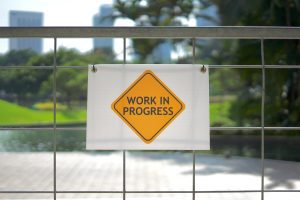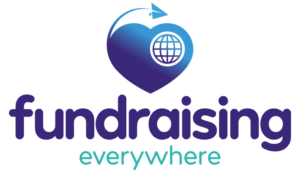
Written by Jo McGuinness MInstF(Dip), Head of Philanthropy & Partnerships at Children 1st
Dear recruiting managers,
I write this to you as something needs to change with the traditional way of recruiting.
This sector is great, but whilst we champion wellbeing, diversity and fairness externally in our charitable work, we are failing those who seek to support these efforts as potential employees.
Back in April 2021 the role I’d held for almost 4 years was highlighted for redundancy. I launched into job hunting immediately – as the sole earner in my family, I had to have an income.
A countdown clock started ticking to find a suitable role; a role I could stay in for a couple of years, remote working and a minimum salary so I could provide for my family.
Between April - September, I applied for 31 jobs, averaging 5 per month.
In total, including looking at job boards, researching roles and organisations, time spent writing covering letters, copying and pasting info from my CV into applications forms, preparing interview answers, fulfilling task briefs and the interviews themselves, I spent in excess of 70 hours job hunting.
70 hours roughly equates to 11 hours of work each month over and above my day job.

Job hunting currently is taking place against a background of a UK in crisis. We’ve got so used to the constant hum of tension, fear and anger that it’s easy to think we can all push on as usual and expect what we expected in 2019.
We can’t. People are struggling.
Job seekers feel fear even more acutely than before Covid-19, everything is more precarious and different things, such as an employer’s home working or maternity policies, are more important than before.
Appreciate the power dynamic. Do what you can to rebalance it.
The minute a job seeker looks at your advert they are on the back foot. Everything is done to your standard; your schedule and they are at your mercy. Anything you can put in place to make the process fairer, more transparent and kinder – the more applicants you will get.
Of the 31 roles I applied for, only 17 offered a conversation for interested candidates. As a job seeker, I cannot tell you just how useful those conversations are for candidates. They shed light on what’s important to you and your organisation and you get a feel for the humans behind the ad.
Of the 17 conversations offered (I took them all up), only 4 were with the actual recruiting manager – all others were with recruiters. Still of value but less insightful.
Please don't forget your manners.
Of the 31 applications made, 5 didn’t notify me at all of whether I was successful or not (I assume not!). Given the average time I spent on an application was over 2 hours, letting applicants know if they’ve been successful or not – a two-minute email, seems a polite thing to do.
Candidates in this sector are often partly drawn to roles due to an affinity or appreciation of your cause, so ask yourself – would you simply not reply to a potential donor if they contacted you?
Not having time isn’t a valid excuse. Make time.
While we are on making time and doing the work, please provide useful, constructive feedback.
It’s disheartening to invest time only to receive no useful feedback on why your application wasn’t progressed. It also asks questions about the transparency of the process.
Some of the no-so-helpful feedback I received when unsuccessful included;
“It was a really competitive process and I don’t have exact feedback on what was lacking in your application I’m afraid.”
“Having had such a good response to the advert, I have selected another candidate for the role with more relevant experience.”
Ugh.
Equally as frustrating is vague feedback given post-interview where you leave the candidate unsure as to what exactly you wanted to see. An example of this was when I was told by the recruiting manager that they “hadn’t really seen my personality” in the interview.
What does that mean?
What am I to do with that feedback?
Please, check your feedback is specific and something that the candidate can improve upon for similar roles in future. You may not see this as your responsibility, but it is. The candidate has given their time, if you have offered feedback you have the responsibility to ensure it is constructive.

Don't think we don't see the red flags.
Employee expectations have changed since 2019. We know that work can be done on the whole, equally as effectively at home.
We can build incredible relationships in the virtual space.
We know it’s better for our health and well-being to spend time doing things we want to do rather than sitting in traffic or on a train.
Roles requiring hybrid working without clear rationale are popping up more on job boards, and it’s not clear why.
If this includes your role, really question yourself – why have I put a requirement for the post holder to come into the office 2 days a week? Is it because there are specific tasks that can only be completed in person? If so, make those tasks clear in the advert.
If you don’t have tasks that can’t be done remotely but you still ‘need’ someone in the office then challenge yourself.
Are you coming from a place of privilege where cost of travel isn’t a big factor for you so paying that to ‘enjoy’ time in the office feels reasonable?
Are you someone who likes the hubbub in an office? Great, but that doesn’t mean others feel the same.
Do you want to see your direct reports busy working, or have them near you in case you need to performance manage?
Yes? Then send yourself on a management training course immediately for the benefit of yourself and your employees.
I pushed back on numbers of days mandatory office working with so many of the roles I applied for and if it wasn’t so frustrating the responses would be funny;
“Well, we have an office and the trustees want us to use it.”
“We need someone from fundraising to be around in case a supporter wants to drop cash in or collect a bucket.”
“We need you to be available for any last-minute meetings.”
Stop it, you're embarrassing yourselves.
Other red flags include;
- Not being willing to offer flexible working
- Requesting in-person interviews, (typically in London) for remote based roles advertised as UK wide
- Not having time to speak to a candidate either prior to or following the interviews
- Not being clear on the salary band,
- Requiring irrelevant educational qualifications
- Or stating ‘equivalent experience’ but not defining what you mean by that.
My absolute favourite red flag is the phrase that needs to be banned with immediate effect;
‘the candidate will need to hit the ground running’.
Usually accompanied by other delightful descriptors such as;
‘fast-paced environment’ and;
‘wants to live and breathe the success of the team and the charity.’
Let’s be frank. Most of us need a job because we have bills to pay. We work in the sector because we choose to, and mostly because it’s a great place to be.
We don’t work here because we want to join a role without suitable induction plans in place, where expectations will be heaped upon you from the get-go, which is what ‘hitting the ground running’ is code for.
Or where we are expected to live and breathe our job. We can care, of course we care – and we should. But please, your candidates are only human. They have other interests and a fair expectation of support and a positive work/life balance.
By including statements like these you are giving an insight into the potentially negative culture, and unachievable expectations the candidate can expect.
Go back, work on that, and recruit once that’s in a better place, or – be honest. You need a candidate to hit the ground running because the workload is 50% more than it should be. In which case, pay more too.
This isn't to say all practise out there is bad, its not. There are shining stars. I just wish I'd seen more of them.

And they aren’t hard things to do. Every recruiting manager could take up at least 1 or 2 of these examples;
- Show the salary and remove all unnecessary educational qualifications.
- Run your adverts and candidate packs through gender bias software, available free here.
- Reduce your essential/desirable criteria down to the bare minimum. You shouldn’t need more than a few points.
- Don’t ask candidates to complete your own application forms. CVs and covering letters are ok, but even better (and more supportive of diversity, inclusion and accessibility as it prevents unconscious bias), is to ask candidates to answer anonymous screening questions relevant to the role.
- Share the interview questions in advance. Lots of folk are trying this now (like Fundraising Everywhere, see Matt Smith’s twitter post). The results are overwhelmingly positive. Doing this supports accessibility, different kinds of thinkers, or those who struggle with nerves.
- Share the grading criteria you have used and make time for specific and constructive feedback.
I see the sector’s recruitment practice improving almost every day as more recruiting managers challenge themselves to do better, but we can do better and faster.
So, my challenge to you is, are you going to get on board or get left behind?
Yours,
All frustrated job seekers out there
Want more content like this?
Check out the *free* webinar Jo spoke at on this topic: How to recruit talented people in 2022.

I couldn’t sleep on Thursday night. I started going over a conversation in my mind from the Events Fundraising Virtual Summit session I’d run that afternoon.
It was a 40 minute round table session to share the of impact redundancy and furlough on events and events fundraisers. Many stories and experiences were bravely shared and it really struck me that for many there hasn’t been a proper opportunity to reflect on the experience of redundancy and furlough. As well as to share and hear from others in a similar boat.
A lot of this is still very raw.
Some of the common themes that came up included:
- Reduced Team Size & resource constraints.
- Feelings of isolation.
- Feeling like events fundraising got the worst deal/suffered the most – whereas other areas of fundraising were more “pandemic proof”.
- Many cancelled events – feeling a lot of hard work had gone to waste.
- Anxiety not knowing how long furlough would last.
- Plus guilt and sadness for colleagues who weren’t so lucky and lost their job.
- Taking a backwards step career-wise or needing to learn new skills fast as having to fill gaps where needed.
- Knocked confidence, feelings of low self-worth & low self-esteem.
- Ongoing recruitment freezes.
- Events staff seconded to other roles.
- Expectations/internal pressure that a smaller events team can still deliver on same programme/strategy.
- Sense of loss and no closure.
We’re being told that life should bounce back now, but with all the limitations and challenges the pandemic has brought, on top of the mental load of this period of trauma, much of which hasn’t been acknowledged or dealt with, how can we get back to normal events fundraising? What even is normal?
The following are some things that have helped my members within The Collective, a community I run for Event Fundraisers. Maybe they’ll help you too.
Talking about and sharing your experiences with peers.
Knowing you’re not alone in your feelings can be so helpful. Admitting how hard you’ve found this and how the effects are still being felt, is a healthy first step. There is absolutely no weakness in admitting how hard this has been and continues to be. In fact, it takes courage and strength.
Use coaching questions to address the challenges you are experiencing with your manager and wider team.
When we’re feeling anxious and overwhelmed it is harder to think logically. Coaching questions can help ground us and re-engage our and others’ logical brains. Keep asking questions of yourself and those around you.
Ceri Sunu delivered a fantastic session on Winning Minds & Buy-In for your Events at the Summit. Ceri shared some coaching models that can be utilised when you want to influence others, including more senior colleagues.
These questions can be used in other situations too. For example, when you’re given yet another piece of work or another event to plan and you know you’re already at capacity, how about asking;
What is the priority here?
What do we want to achieve by doing this?
What could we do differently?
What’s the impact of doing that event? Or not doing that event?
Be mindful
Try and make a habit of taking time out of your week to reflect on the past 7 days; what lessons have been learnt, challenges and wins and then what your focus will be going forward. You can do this individually or as a team. In The Collective we do this weekly as part of our regular Thursday Catch Ups. These periods of reflection help you pause within the chaos, untangle experiences and spot patterns and meaning.
Recognise there may now be better ways to do things than in 2019.
This could be a fantastic time to instil some new ways of working for yourself and your wider team or organisation. There might be different events that work better than the ones you used to do, a more hybrid approach to your events to ensure accessibility and maximise participation, there might be different ways to divide the workload up, different systems you can use, different processes. Don’t forget your audience have also been through a traumatic 2 years. Their needs, wants and desires may well have changed too. If you’re not sure, ask them.
Be compassionate and understanding of yourself and others.
If the Summit roundtable proved anything it was that these feelings are not isolated cases. This is widespread and it is unchartered territory. Your leaders haven’t been in this situation before either and therefore some mistakes are inevitable. They may be under enormous pressure which is getting filtered down to you.
It might feel like there is major catching up to do after so long without in-person events and so long out of the office but remember that the smallest steps, those little 1% tweaks over time amount to big change.
Just as it took us several months to get our heads around lockdowns and covid restrictions, it will take a period of adjustment to move into this next phase.
You’re not alone
I started The Collective right at the start of the pandemic as a place to get more peer support, a safe space to share and bounce ideas around with other forward-thinking event fundraisers, plus attend training and workshops for continued professional development so fundraisers can thrive and do their best work. If that sounds like you, give me a shout.
The Collective is always open for new members and this is a great time to join.




